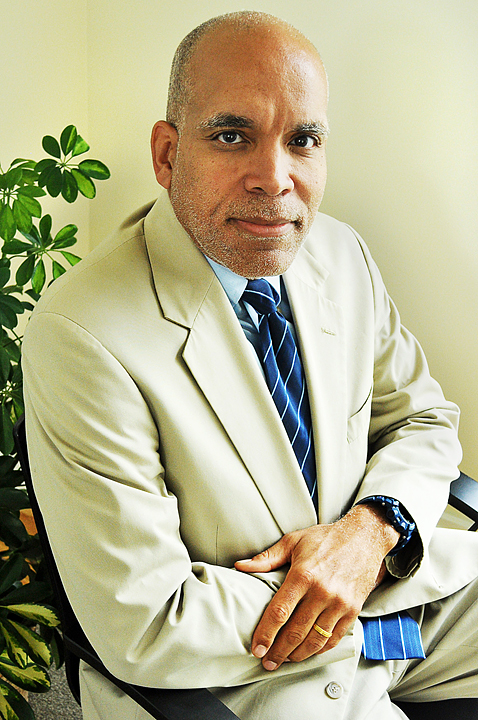
On Thursday, September 2, President Raynard Kington delivered the year’s first Scholar’s Convocation address entitled “Racial and Ethnic Disparities in Health in the US: Patterns, Causes, Trends.” He spoke for just over an hour on interdisciplinary research in American health across racial groups and subgroups, covering topics such as health care availability and quality, mortality rates and the obesity epidemic.
Afterward, S&B reporters Samantha Schwartz and Jon Cohen sat down with the new president to discuss his convocation address, his previous experience as Deputy Director to the National Institute of Health and his vision for Grinnell College.
Q: You come to the college most recently from the National Institute of Health, and your primary areas of study have been in medicine and economics. How have your career experiences prepared you to be president at Grinnell?
A: There are several reasons. It was a good background for understanding the direction of higher education in the United States as it moves toward interdisciplinary scholarship. I have experience running a large organization, and both small and large components of an organization. The biggest reason is that in my last ten years at NIH I’ve worked with a range of very different constituencies united by a common interest, in that case, health research. I was forced to learn to function at the intersection of communities with different perspectives, and I had to translate, and I had to connect, and I had to help in unite these communities around a common goal, which was trying to create new knowledge in the biomedical and behavioral sciences.
Q: In your convocation speech, you seemed still very much invested in healthcare in the U.S. How did you know you were ready to leave NIH and take on this new challenge?
A: I was looking for a change. I considered a lot of options: foundations, state government, academia. I could have returned to being a professor at a university. But then I got an offer to consider becoming the president of an undergraduate college. That eventually ended up being the wrong fit for me, but it got the idea in my head. I fell in love with liberal arts education and its clear mission: a lifetime of learning. The students are not just students of a college; they are students of life. I also liked the social justice aspect of Grinnell. Both notions drew me to this job.
Q: You seem to think of health in very broad terms. How would you define health?
A: Health determines so many things. Health has an incredible range of impacts on every dimension of life. At its crudest level, it’s whether or not you’re alive, but beyond that it is about the quality of your life – about whether or not you can do what you need to do and want to do: can you feed yourself, dress yourself and other so-called activities of daily living and then beyond that, to functions like being able to drive and earn a living — it’s about the quality of life. Health encompasses a whole range of lived experiences.
Q: What has surprised you most about Grinnell since you took office?
A: The single biggest surprise is sort of weird; it’s the space, the physical space. Things are spread out here. Walking around from the president’s home to the campus, there’s just so much space. My neighborhood in Washington was not a typical suburban area. It was urban and the houses were close together. We didn’t have these spacious yards and the trees are more dense. Beyond that, I was so impressed by how beautiful the campus is. It’s like a Hollywood movie set for a college campus. I was also surprised by how nice people are. I was told they would be, but I was still surprised.
The other big surprise is being recognized on and especially off campus. That was surprising. It was just interesting how many times people would just come up and say ‘You’re the new president of Grinnell, aren’t you?’ Even as president of a large organization like the NIH, I could drive three blocks and no one recognized me. I can’t do this here.
Q: In your speech, you spoke of scholars from multiple disciplines coming together to research and solve problems in healthcare. What can students at Grinnell do to become an active part of solving these problems?
A: Try to improve health in your own world. This is a relatively healthy campus: you’re young, well educated, dedicated to physical fitness, and by and large, your diets are pretty good. What you can do is reach out to the broader community. There’s no magic fix. It’s takes a willingness to make just a small difference.
Q: Grinnell has undergone a lot of change in the last ten years. What is your vision for the college ten years from now?
A: I think Grinnell is an incredible jewel in the higher education system of this country, and it doesn’t get the recognition it deserves. Also, I want to continue manifesting values like equal opportunity, educational excellence, and social justice. I hope I can facilitate helping the school manifest its core values.
Q: There’s a poll on the back page of this issue [shameless plug] asking students to pick a nickname for you. Ray-K or RSK?
A: Definitely not Ray-K.
























































